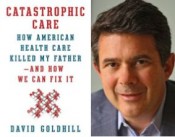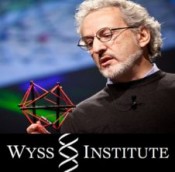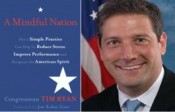Q&A: DAVID GOLDHILL, AUTHOR- CATASTROPHIC CARE: How American Health Care Killed My Father And How We Can Fix It
Written on October 31st, 2014 |
Aired: 02/03/13
This week, my guest is DAVID GOLDHILL. After the death of his father, Goldhill, a business executive, began a personal exploration of a health-care industry that for years has delivered poor service and irregular quality at astonishingly high cost.
His September 2009 Atlantic cover story rocked the health-care world, and Goldhill has written a book expanding on the topic, Catastrophic Care: How American Health Care Killed My Father-And How We Can Fix It. It is a system, he argues, that is not worth preserving in anything like its current form. He asserts Obamacare will not fix it, and offers his own radical solution.
* As a nation, we now spend almost 18% of our GDP on health care.
* In 1966, Medicare and Medicaid made up 1% of total government spending; now that figure is 20%.
* The federal government spends
– 8 times as much on health care as it does on education
— 12 times what it spends on food aid to children and families
— 30 times what it spends on law enforcement
— 78 times what it spends on land management and conservation
— 87 times the spending on water supply
— 830 times the spending on energy conservation.
* For every two doctors in the U.S., there is now one health-insurance employee-more than 470,000 in total. In 2006, it cost almost $500 per person just to administer health insurance.
Q&A: Don Ingber – Innovation Inspired by Nature
Written on June 18th, 2014 |
Aired 05/06/12
After 3.8 billion years of R&D on this planet, failures are fossils. What surrounds us in the natural world is what has succeeded and survived. So why not learn as much as we can from what works? Nature, imaginative by necessity, has already solved many of the problems we are grappling with. Animals, plants, and microbes are the consummate engineers. They have found what works, what is appropriate, and most important, what lasts here on Earth.
In January 2009, Harvard received the largest philanthropic gift in its history — $125M — to create the Wyss Institute for Biologically Inspired Engineering, and today’s guest is its founding director, DON INGBER. I find this whole notion of imitating nature one of the most exciting developments in human activity and something that gives me great hope.
The human body is an engineering marvel that maintains its balance while executing complicated movements, and senses and adapts to heat and cold. Every 20 seconds, it circulates blood through its extremities. Its cells are able to replace wounded tissue, find and destroy dangerous invaders, and interconnect to produce thoughts and emotions. Our bodies – and all living systems – accomplish tasks far more sophisticated and dynamic than any entity yet designed by humans. By emulating nature’s principles for self-organizing and self-regulating, Wyss researchers develop innovative engineering solutions for healthcare, energy, architecture, robotics, and manufacturing.
Q&A: TIM RYAN Congressman – Author, A MINDFUL NATION
Written on August 8th, 2012 |
Aired 08/05/12
I am joined by Ohio Congressman Tim Ryan, who offers a radical solution to the stresses and problems that face Americans today — radical in its original meaning of having to do with roots of things. He has written a book, A MINDFUL NATION: How a Simple Practice Can Help Us Reduce Stress, Improve Performance, and Recapture the American Spirit. Ryan has a daily practice of meditation and now he’s advocating that the spread of similar practices could help heal us, not just as individuals but as a nation. His book is filled with examples of how mindfulness is already being successfully applied in education, healthcare, even the military.
